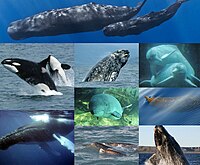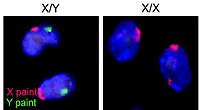
The plasma phospholipidome of Tursiops truncatus: From physiological insight to the design of prospective tools for managed cetacean monitorization.
Sign Up to like & getrecommendations! Published in 2021 at "Lipids"
DOI: 10.1002/lipd.12307
Abstract: Plasma biochemical analysis remains one of the established ways of monitoring captive marine mammal health. More recently, complementary plasma lipidomic analysis has proven to be a valid tool in disease diagnosis and prevention, with the… read more here.
Keywords: plasma; physiological insight; plasma phospholipidome; phospholipidome tursiops ... See more keywords

Assessing the relationship between cetacean strandings (Tursiops truncatus and Stenella coeruleoalba) and fishery pressure indicators in Sicily (Mediterranean Sea) within the framework of the EU Habitats Directive
Sign Up to like & getrecommendations! Published in 2017 at "European Journal of Wildlife Research"
DOI: 10.1007/s10344-017-1111-8
Abstract: Cetacean strandings are a constant phenomenon that occurs on coastlines; mortality is related to several factors but commercial fishing is considered one of the main pressures, in the Mediterranean, that can impact small cetacean species… read more here.
Keywords: cetacean strandings; sea; mediterranean sea; stenella coeruleoalba ... See more keywords

Bottlenose dolphin (Tursiops truncatus) sperm revisited: Motility, morphology and ultrastructure of fresh sperm of consecutive ejaculates.
Sign Up to like & getrecommendations! Published in 2018 at "Animal reproduction science"
DOI: 10.1016/j.anireprosci.2018.06.009
Abstract: Computer aided sperm analysis systems allow detailed examination of sperm motility and morphology variables, which are important for the understanding of the spermatology of a species and the development of assisted reproductive techniques. Cetacean biology… read more here.
Keywords: consecutive ejaculates; motility morphology; morphology ultrastructure; morphology ... See more keywords

Development of a bioenergetic model for estimating energy requirements and prey biomass consumption of the bottlenose dolphin Tursiops truncatus
Sign Up to like & getrecommendations! Published in 2017 at "Ecological Modelling"
DOI: 10.1016/j.ecolmodel.2017.05.001
Abstract: The bottlenose dolphin (Tursiops truncatus) is a common species in coastal temperate waters and the ideal candidate for developing a conceptual bioenergetic model given that sufficient information is available to parameterize key input variables. A… read more here.
Keywords: year; model; bioenergetic model; tursiops truncatus ... See more keywords

Foraging habits and levels of mercury in a resident population of bottlenose dolphins (Tursiops truncatus) in Bocas del Toro Archipelago, Caribbean Sea, Panama.
Sign Up to like & getrecommendations! Published in 2019 at "Marine pollution bulletin"
DOI: 10.1016/j.marpolbul.2019.04.076
Abstract: A small and genetically isolated bottlenose dolphin (Tursiops truncatus) population resides year-round in the Bocas del Toro Archipelago-Panama (BDT). Photo-identification and genetic data showed that this dolphin population is highly phylopatric and is formed exclusively… read more here.
Keywords: del toro; toro archipelago; population; tursiops truncatus ... See more keywords

First report from North America of microplastics in the gastrointestinal tract of stranded bottlenose dolphins (Tursiops truncatus).
Sign Up to like & getrecommendations! Published in 2020 at "Marine pollution bulletin"
DOI: 10.1016/j.marpolbul.2020.111677
Abstract: Microplastics' (MPs) abundance, small size, and global distribution render them bioavailable to a variety of organisms directly or by trophic transfer, yet examinations in marine apex predators are currently limited. The present study investigated the… read more here.
Keywords: tursiops truncatus; gastrointestinal tract; stranded bottlenose; dolphins tursiops ... See more keywords

Re-evaluating the significance of the dive response during voluntary surface apneas in the bottlenose dolphin, Tursiops truncatus
Sign Up to like & getrecommendations! Published in 2019 at "Scientific Reports"
DOI: 10.1038/s41598-019-45064-8
Abstract: The dive response is well documented for marine mammals, and includes a significant reduction in heart rate (fH) during submersion as compared while breathing at the surface. In the current study we assessed the influence… read more here.
Keywords: voluntary surface; surface; dive response; surface apneas ... See more keywords

Field energetics and lung function in wild bottlenose dolphins, Tursiops truncatus, in Sarasota Bay Florida
Sign Up to like & getrecommendations! Published in 2018 at "Royal Society Open Science"
DOI: 10.1098/rsos.171280
Abstract: We measured respiratory flow rates, and expired O2 in 32 (2–34 years, body mass [Mb] range: 73–291 kg) common bottlenose dolphins (Tursiops truncatus) during voluntary breaths on land or in water (between 2014 and 2017). The… read more here.
Keywords: range; mass; bottlenose dolphins; dolphins tursiops ... See more keywords

Whistling is metabolically cheap for communicating bottlenose dolphins (Tursiops truncatus)
Sign Up to like & getrecommendations! Published in 2019 at "Journal of Experimental Biology"
DOI: 10.1242/jeb.212498
Abstract: ABSTRACT Toothed whales depend on sound for communication and foraging, making them potentially vulnerable to acoustic masking from increasing anthropogenic noise. Masking effects may be ameliorated by higher amplitudes or rates of calling, but such… read more here.
Keywords: rmr; bottlenose dolphins; metabolically cheap; dolphins tursiops ... See more keywords

Skin marks in bottlenose dolphins (Tursiops truncatus) interacting with artisanal fishery in the central Mediterranean Sea
Sign Up to like & getrecommendations! Published in 2019 at "PLoS ONE"
DOI: 10.1371/journal.pone.0211767
Abstract: Skin marks occur frequently in many cetacean species across the globe revealing a broad spectrum of causes, including social interactions, infectious diseases and injuries produced by anthropogenic factors. The current study used photo-id data from… read more here.
Keywords: din; skin marks; skin; bottlenose dolphins ... See more keywords

Ranging Patterns and Exposure to Cumulative Stressors of a Tursiops truncatus (Common Bottlenose Dolphin) in Georgia
Sign Up to like & getrecommendations! Published in 2019 at "Southeastern Naturalist"
DOI: 10.1656/058.018.0112
Abstract: Abstract Tursiops truncatus (Common Bottlenose Dolphin) in Georgia are exposed to multiple natural and anthropogenic stressors. Here, we describe a case study of an adult, male Common Bottlenose Dolphin entangled in marine debris, that was… read more here.
Keywords: truncatus common; georgia; common bottlenose; bottlenose dolphin ... See more keywords